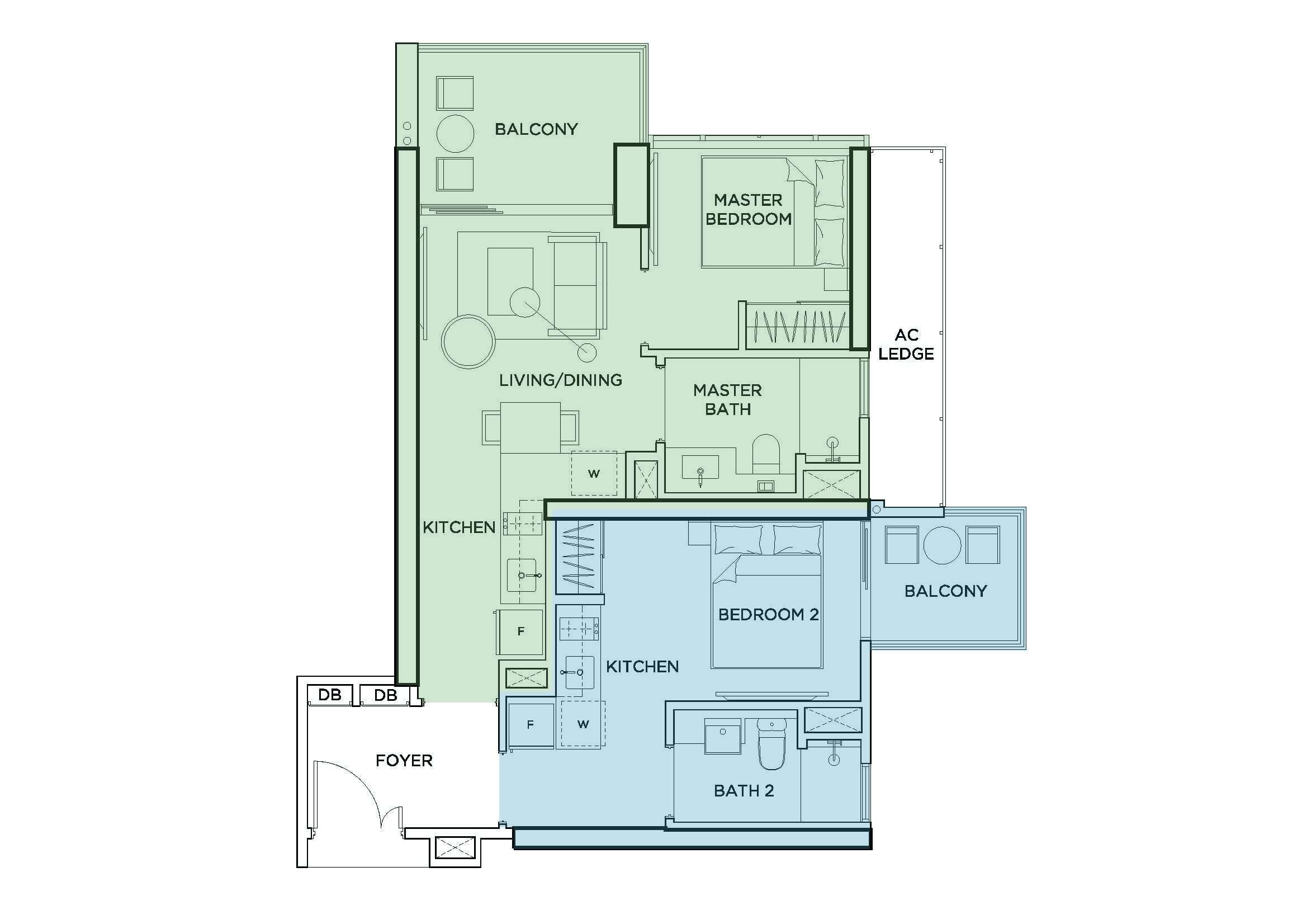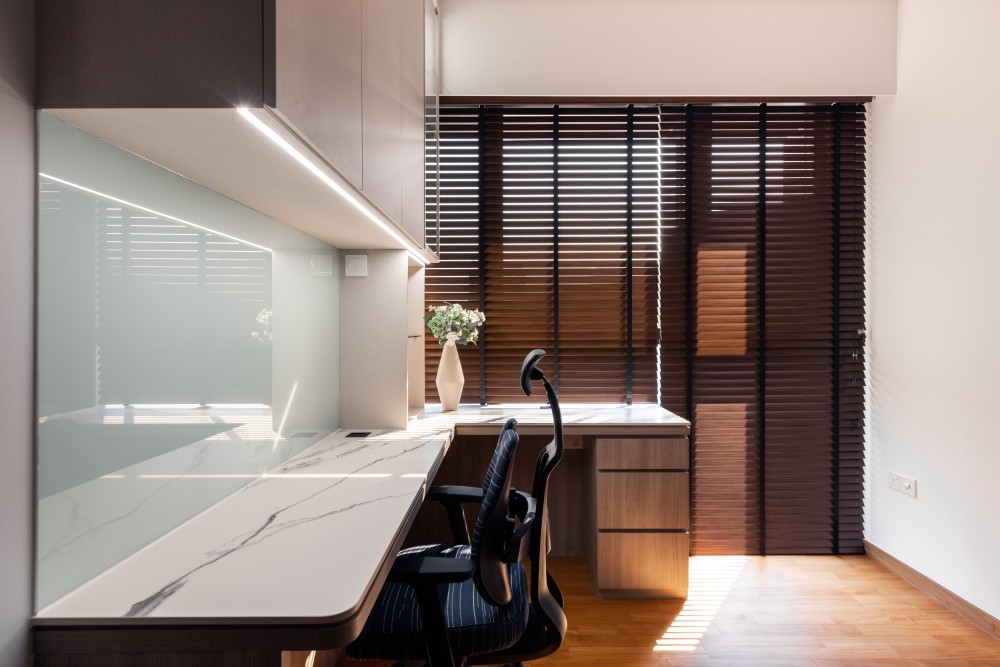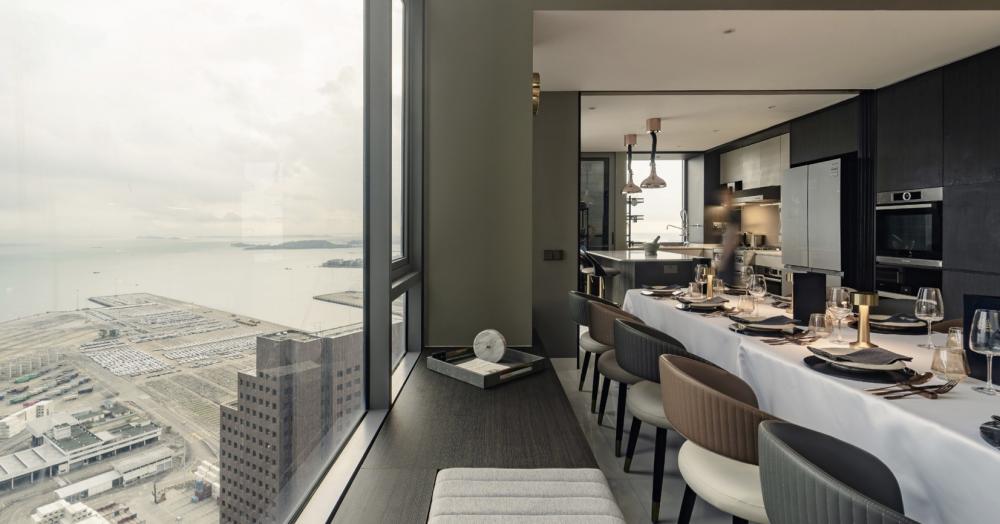Should You Buy A Dual Key Unit?
The unique appeal of dual key units in Singapore’s real estate market has prompted many prospective buyers to consider this housing option.
In this article, we take a deep dive into the various facets of dual key units, and analyze their advantages and potential drawbacks to help Singaporean homebuyers make informed decisions.
What Are Dual Key Units?
Dual key units are a unique and innovative concept within the Singaporean real estate market.
Unlike traditional housing options that typically offer one standard living space per unit, dual key units present a layout that integrates two self-contained living spaces within a single apartment.
These units are designed with a thoughtful division, often comprising a primary living area (the main unit) and an adjoining secondary space (the studio unit or annex).
Dual key units are commonly found in various condominium developments across Singapore, particularly in newer condominium projects.
Developers often integrate these units into their offerings to cater to the diverse needs of homebuyers looking for versatile living spaces. They might also be available in some executive condominiums (ECs), although their prevalence might not be as widespread.
Dual Key Unit Configurations
Dual key units often come in different layouts and configurations to suit varying preferences and household sizes.
As mentioned previously, the configurations usually involve a primary unit (which can range from a studio to multiple bedrooms) and a secondary unit (usually smaller and more compact than the primary unit).
Some common configurations include:
2 Bedroom + Studio: This configuration typically includes a 2-bedroom primary unit along with a smaller studio unit. The primary unit might feature two bedrooms, a living area, kitchen, and bathrooms, while the studio unit could comprise a compact living space with basic amenities like a kitchenette and a bathroom.
3 Bedroom + 1 Bedroom: In this setup, the primary unit could consist of three bedrooms, a living room, kitchen, and bathrooms, while the secondary unit might have one bedroom along with a smaller living space and basic facilities.
4 Bedroom + Studio or 2 Bedroom: For larger dual key units, the primary unit might feature four bedrooms, a spacious living area, kitchen, and multiple bathrooms. The secondary unit in this scenario could either be a studio or a smaller 2-bedroom setup.
These configurations are designed to cater to different household compositions, offering options for families with varying sizes, multigenerational living arrangements, or homeowners looking to generate rental income by leasing out one part of the unit while residing in the other.
The variety in configurations allows potential buyers to choose the setup that best aligns with their specific needs and preferences.
Advantages Of Buying A Dual Key Unit
Now that you know how dual key units work, let’s talk about the advantages that you get with a dual key unit.
For those purchasing dual-key units for their own stay, dual key units provide great flexibility, especially for multigenerational families.
While the different generations are staying together in the same apartment, you still get the ability to maintain a sense of independence and privacy for each family unit.
For families with elderly parents or relatives, for example, dual key units offer an ideal setup.


The secondary unit can be dedicated to older family members, providing them with their own space while ensuring they are still within reach for assistance and care.
How about those who are purchasing dual-key units, so they can rent part of their space out?
For savvy homeowners, dual-key units offer a fantastic opportunity to generate rental income by leasing out the secondary unit while residing in the primary living space.
This additional income stream can significantly offset mortgage payments or other expenses related to homeownership.
The barrier to entry to becoming a landlord (and generating rental income) is also significantly reduced when you have a dual-key unit.
If you don’t own such a unit, you have two other options:
Option 1: Purchase two properties – one for your own stay, and one which you can rent out.
Option 2: Purchase one property to stay in, and rent out a room to generate rental income.
First, let’s discuss option 1.
Purchasing two separate properties entails a substantial initial investment, including down payments, taxes, and associated costs. In contrast, investing in a dual-key unit requires a single purchase, reducing the upfront capital required compared to owning two distinct properties.
On top of that, when you purchase two separate properties, you’ll also need to fork out Additional Buyer Stamp Duty (ABSD) for your second property.
All in all, having two properties will definitely create more of a financial strain, as compared to having one property which you can live in and rent out.
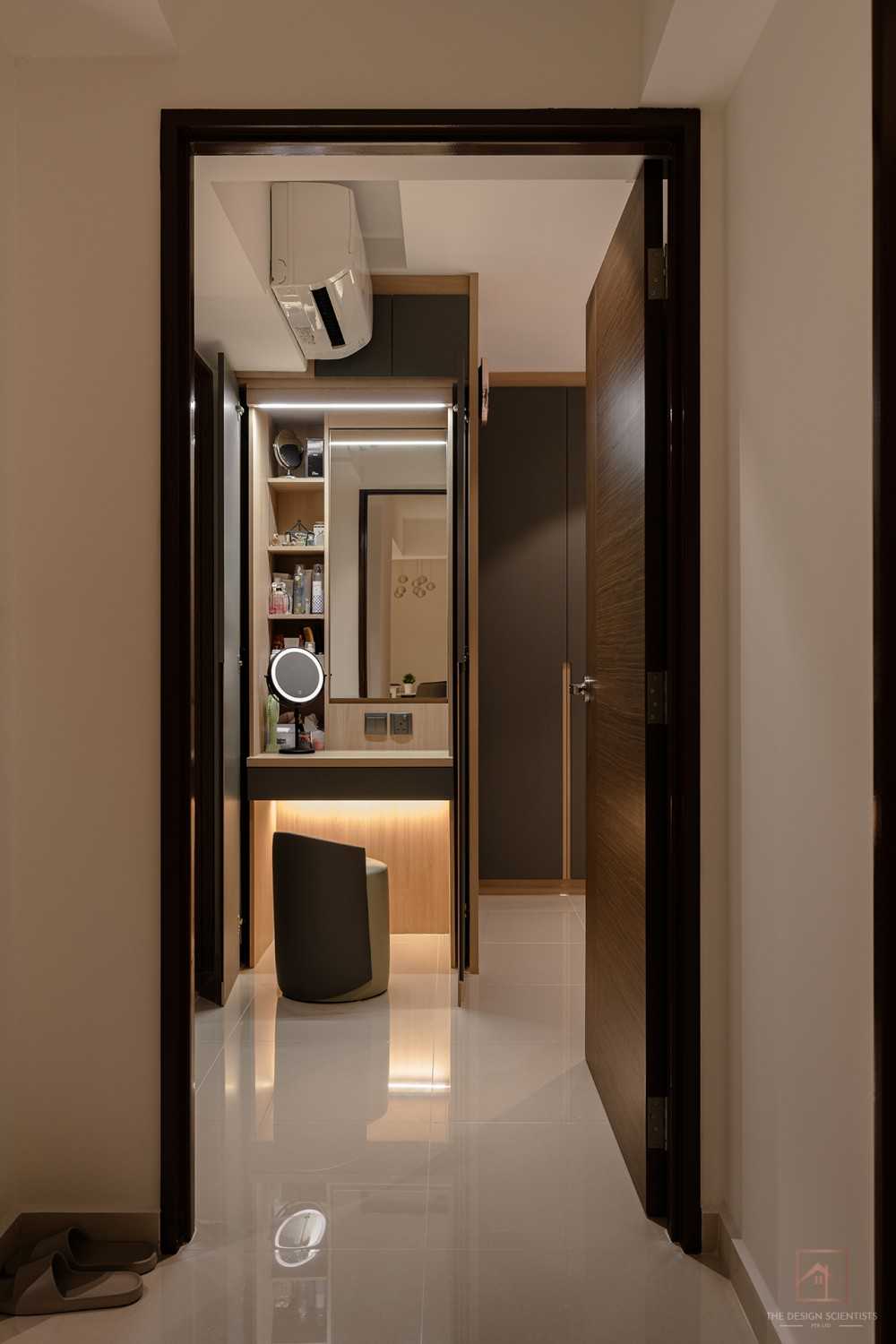

206B Woodleigh Link ($65,000) by The Design Scientists
Now, let’s move on to discuss option 2.
With this option, you’re simply renting out a room in your home to generate rental income.
For many homeowners, this is a perfectly viable option.
You don’t need to have a dual-key unit to rent out part of your space – it’s perfectly fine to rent out a room in a normal (non dual-key) apartment as well.
However, with this type of set up, there are certain tradeoffs to keep in mind.
Firstly, when renting out a room in a non-dual-key apartment, privacy becomes a significant consideration.
Both the homeowner and the tenant might experience a reduced sense of privacy compared to the distinct living spaces provided by a dual-key unit.
Remember: Unlike dual-key units where separate living spaces are designated for the homeowner and the tenant, renting out a room in a non-dual-key apartment often means shared common areas, such as the kitchen, living room, or bathrooms.
This shared living arrangement will definitely impact the level of privacy and personal space for both parties.
If both the landlord and tenant have plans to stay in on Saturday night and watch Netflix, for example, who gets dibs on the TV and the sofa?
The bottom line: from the perspective of the homeowner, having a tenant in the same living space will definitely affect your lifestyle and routine.
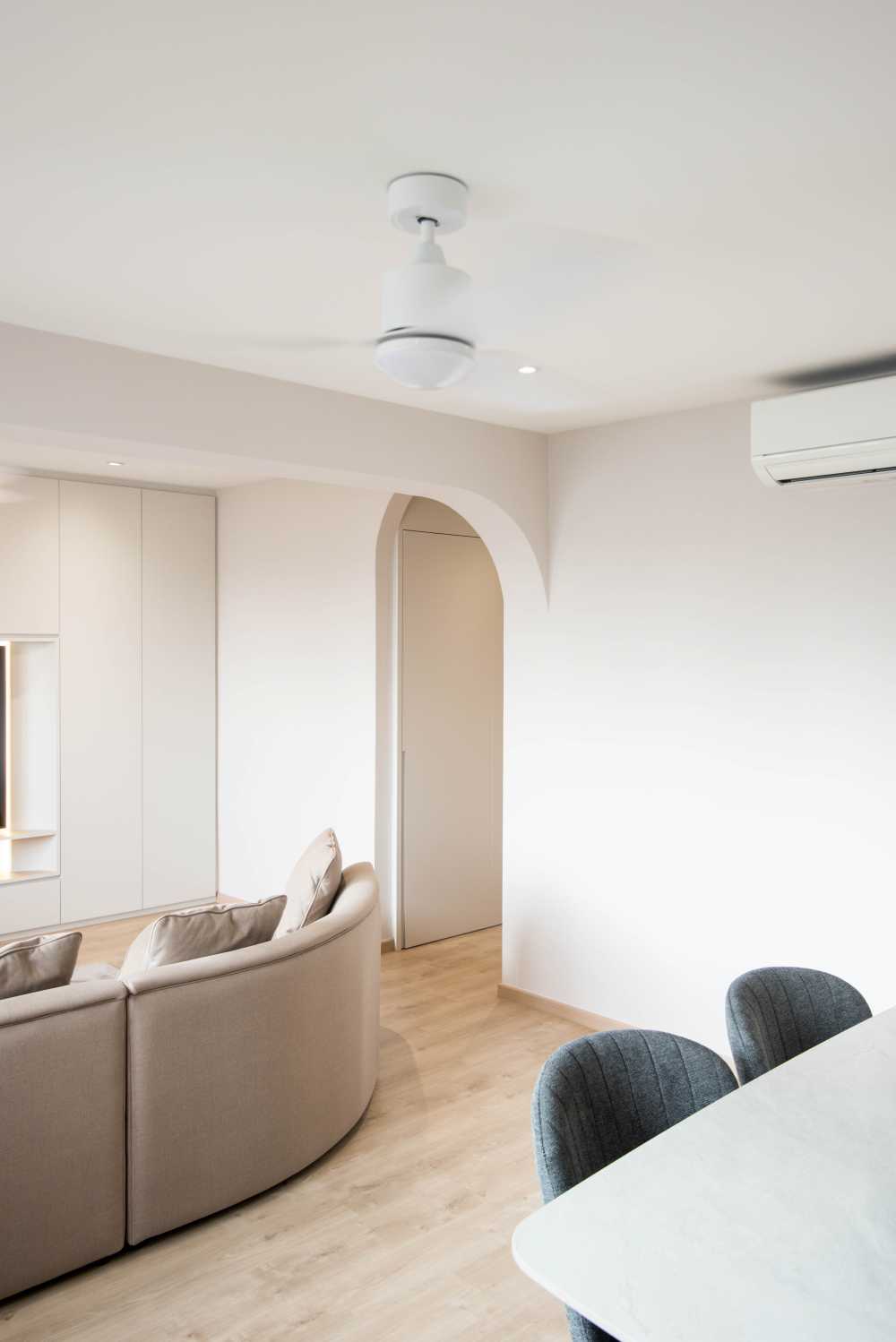

Teck Whye ($100,000) by De Style Interior Pte Ltd
Disadvantages Of Buying A Dual-key Unit
Now that we’ve discussed the advantages of buying a dual-key unit, let’s look at the flip side, and talk about what to keep in mind.
One major factor is that dual key units typically have a higher upfront cost compared to traditional units.
Dual-key units often come with a premium price tag due to their unique configuration and the added flexibility they offer.
As such, the cost of purchasing a dual-key unit is likely to be notably higher compared to a similarly sized traditional unit within the same development or area.
(However, it will still be more affordable as compared to purchasing two units – one for your own stay, and one to rent out).
Another factor to consider is the potential compromise in space.
Dividing the unit into two separate living spaces might result in smaller individual units compared to a single, larger traditional unit of the same total size.
While the total square footage of the unit might look appealing, remember that the amount of space each family gets access to is only a fraction of that entire space.
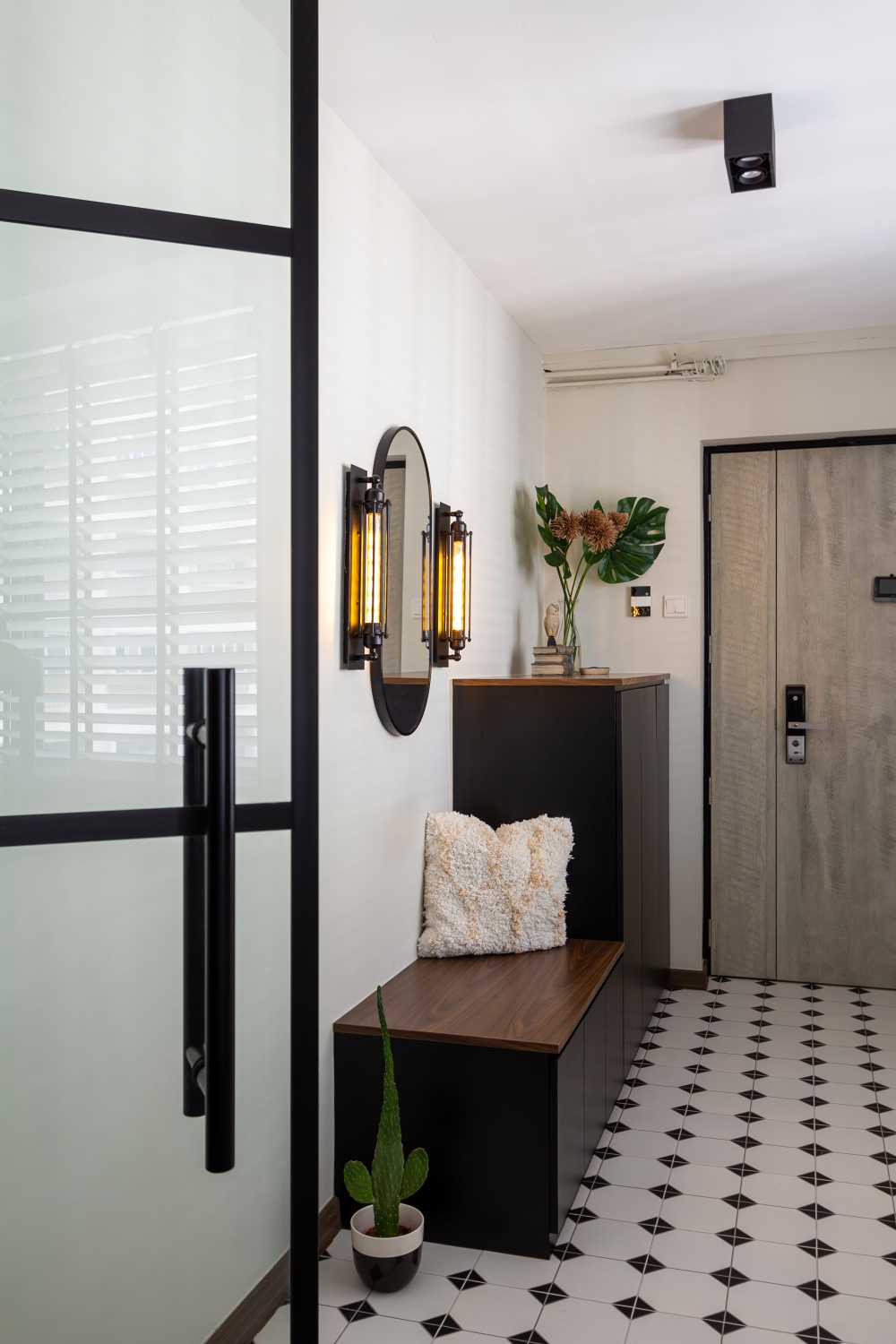

206B Woodleigh Link ($65,000) by The Design Scientists
Who Should Consider Buying A Dual Key Unit?
We’ve talked about the specific scenarios in which buying a dual-key unit makes sense.
Now, let’s recap on the types of individuals and households that might find a dual-key unit appealing.
Firstly, families with multiple generations living together can greatly benefit from the versatility of a dual-key unit.
The separate living spaces allow for independent living while maintaining proximity, ideal for accommodating elderly parents, adult children, or extended family members.
Next, individuals interested in property investment and generating rental income can find dual-key units attractive.
The ability to lease out one part of the unit while residing in the other presents a viable income-generating opportunity.
That aside, entrepreneurs or individuals running home-based businesses may find the separate units in a dual-key setup beneficial.
It provides a dedicated space for business operations while maintaining a distinct living area.
A Final Word On Dual Key Units
In our exploration of dual-key units, we’ve uncovered their unique advantages and considerations for prospective buyers. These innovative living spaces cater to diverse needs, offering flexibility for multigenerational families, income opportunities for investors, and lifestyle options for individuals.
However, keep in mind that while dual-key units offer independence within proximity for families and income potential for homeowners, they also come with higher upfront costs and potential compromises in space.
Ultimately, choosing a dual-key unit requires a careful balance of priorities and considerations. Understanding the trade-offs against the benefits is crucial in making a well-informed decision.
Whether it’s opting for a traditional setup, exploring rental opportunities, or considering a dual-key unit, each choice presents its own set of advantages and trade-offs.
The decision ultimately rests on aligning individual needs, preferences, and long-term goals with the available housing options in Singapore’s dynamic real estate market.
Want to check out home renovation projects for more inspiration? Browse home renovation projects on Hometrust, or click the button below to get connected with expert designers!
Renovating soon? Let Hometrust recommend the best interior designers.
If you are reading this, you are probably wondering how you can create your dream home.
Here’s the thing, everyone’s needs and requirements for their home renovation is different. A designer that may work for someone else, may not quite work for you.
At Hometrust, we’re here to help match top rated designers, recommended by past homeowners to you through our data-driven and matching algorithm.
Whether you are looking for partial renovation or a full fledge overhaul, we’ll be able to recommend you top designers to match your renovation requirements and lifestyle.
Recommendations and free and you can simply start by helping us understand your needs below!
Get RecommendationsRenovate safe!
The Hometrust Team

